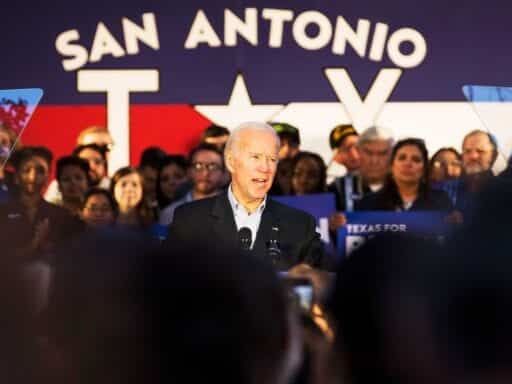It’s an important victory in one of the biggest Super Tuesday states.
Former Vice President Joe Biden has won the Texas Democratic primary, edging out Vermont Sen. Bernie Sanders who was widely expected to win the state until the eve of Super Tuesday.
It’s a win that solidifies Biden’s resurgence after his sweeping victory on Saturday in South Carolina, where he beat Sanders by nearly 30 points. Biden’s campaign had lost momentum following his poor performance in other early voting states, so his recent wins, both in South Carolina and in Texas, may come to the relief of Democratic centrists concerned about Sanders’s electability.
Texas has the second-largest number of delegates at stake among the 14 states with Super Tuesday contests: It will award 228 delegates, 149 of which are tied to the results in 31 individual state Senate precincts and the remaining 79 of which are awarded based on statewide results.
Candidates must capture at least 15 percent of the vote in a single district in order to be awarded those precinct-level delegates and at least 15 percent of the vote statewide for statewide delegates. About 12 percent of registered voters participated in early voting, which ended on Friday.
Going into Super Tuesday, it appeared to be a tight contest in Texas between Sanders and former Vice President Joe Biden. Sanders came to Super Tuesday having recently won back-to-back victories in New Hampshire and Nevada and had been expected to win in Texas until Monday, when Biden picked up endorsements from a slew of candidates who had dropped out of the Democratic primary.
As of March 3, FiveThirtyEight’s average of national polling data showed Sanders in a narrow lead with about 28 percent support, following by Biden at about 26 percent and former New York City Mayor Mike Bloomberg at 17 percent. The latest University of Texas/Texas Tribune poll, by comparison, showed Sanders with 24 percent support, just ahead of Biden’s 22 percent support.
Texas is a minority-heavy state. It is one of the states with the largest shares of eligible Latino voters, who make up about 30 percent of the state electorate. Black voters also accounted for about 13 percent of the electorate. Non-Hispanic white voters, by comparison, made up about 46 percent, according to 2018 data from the US Census Bureau.
Sanders has been relying on Latino support to capture the Democratic nomination: He is trying to appeal to them with a progressive policy platform that speaks to their core interests — health care, jobs, and, for some, immigration — and has invested heavily in spreading his message, in both Spanish and English, to Latino communities in Texas and other states. But on Tuesday in Texas, that strategy didn’t appear to work.
In the 2016 Texas primary, Hillary Clinton and Sanders captured about 65 percent and 33 percent of the vote respectively before she later went on to win the Democratic nomination. Trump won Texas, which has long been a solidly red state, by a margin of about 9 percent percent in the general election over Clinton.
It’s possible that Texas could flip blue in 2020 for the first time since 1976. The 2018 midterm elections showed the start of that shift: Former Texas Congressman Beto O’Rourke, a Democrat, challenged Republican Senator Ted Cruz, narrowly losing by a margin of only about 2 percent. The shift appears to be primarily driven by college-educated voters, rather than, as conventional wisdom goes, the growing number of Latino voters in Texas.
Author: Nicole Narea
Read More



